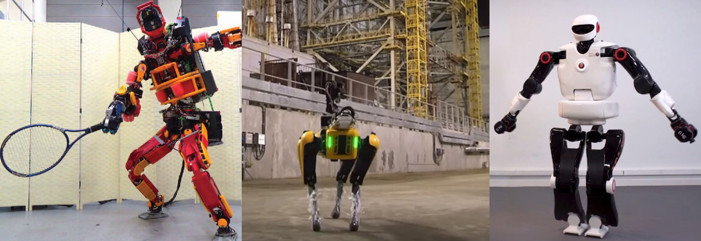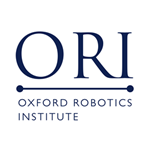Oxford Robotics Institute | Projects - UK RAS Legged Robotics Task Group
UK-RAS Legged Robotics Task Group
This Legged Robotics Task Group was formed in February 2020 to provide a central organising hub to bring together UK academics in the emerging field of dynamic walking robots. Funding is generously provided by UK-RAS – an academic leadership body for the UK Robotics.
We intend to form a collective body of academics, researchers and industrial partners in legged and mobile robotics in the UK, host public engagement events in 2020, and catalyze potential emerging industrial sectors for assisted living, warehouse logistics, construction and more.
By hosting the proposed events, we aim to underpin the UK’s potential for autonomous legged & mobile robotics and educate early career research students in the field.
Events in 2020
Webinar 10 December, 9:30 – 10:30 [UK time] in association with the ISCF RAIN Hub
Zoom link: https://zoom.us/j/708659623
- Introduction [9:25-9:30am; UK]
- Dr. Dave Megson Smith, University of Bristol [9:30 - 9:50am; UK] Topic: Spot in Chernobyl
- Dr. Olivier Stasse, LAAS-CNRC [9:50 - 10:10am; UK] Title: Motion generation for humanoid and complex robots: from Motion Planning to Whole body controller
- Dr. Kunio Kojima / Dr. Yuta Kojio, University of Tokyo [10:10 - 10:30am; UK] Title: Hardware Design and Locomotion System of JAXON
Biographies
- David Megson-Smith is a researcher at the University of Bristol. He specialises in sensors for nuclear and medical application. Within the nuclear space specifically, he has developed systems for remote robotic deployment including robotically operated Raman sensors, hyperspectral imaging systems, stereovision and solid-state LIDARs. Most recently, he was part of the team responsible for the rapid, in-field development of a scanning gamma spectroscopic imager, which was deployed within the New Safe Confinement of the Chernobyl nuclear power plant.
- Olivier Stasse is a CNRS Senior scientist in humanoid robotics at LAAS-CNRS, Toulouse France. He received in 2000 a Ph.D. on Intelligent Systems from the University of Paris 6, and the French Habilitation to Supervise Research (HDR) in Robotics (2013) from the University of Toulouse III. From 2000 to 2003, he was assistant professor at the Univ. of Paris XIII. From 2003 to 2011, he was at the Joint French-Japanese Robotics Laboratory (JRL) between the CNRS and the AIST in Tsukuba. In 2011 he joined the Gepetto team at LAAS. His research interest is in fast decision making to generate motion for humanoid robotics. He managed the specifications and the contracting of the first humanoid robot of the TALOS serie from PAL-ROBOTICS. He is co-directing the joint lab ROB4FAM with Airbus Toulouse, and is currently serving as an Associate Editor for the IEEE Transactions on Robotics.
- Kunio Kojima and Yuta Kojio are assistant professors of The University of Tokyo. Kunio Kojima completed his PhD Thesis on the Graduate School of Interdisciplinary Information Studies of the university in September 2018, supervised by Prof. Masayuki Inaba. His current research is mechanical design and joint torque control for humanoids. Yuta Kojio completed his PhD Thesis on the Graduate School of Information Science and Technology of the university in March 2020, supervised by Prof. Masayuki Inaba. His current research is real time footstep control considering visual information for humanoids.

Webinar 12 November, 9:30 – 10:30 [UK time]
- Introduction [9:25-9:30am; UK]
- Prof. Michael Mistry, University of Edinburgh [9:30 - 9:50am; UK] Title: "Impedance Control for Robust Quadruped Locomotion"
- Dr. Christian Gehring, CTO of ANYbotics [9:50 - 10:10am; UK] Title: "Four-legged robots at work"
- Dr. Simon Watson, University of Manchester [10:10 - 10:30am; UK] Title: "Corin – a hexapod for non-planar motion research"
Biographies
-
Michael Mistry is a Professor and Personal Chair of Robotics at the School of Informatics, University of Edinburgh, and the Director of the Centre for Doctoral Training in Robotics and Autonomous Systems at the Edinburgh Centre for Robotics. Michael’s research focuses on the principles behind dexterous movement and control in robots and humans, particularly in environmental contact. This work spans operational space control, redundancy resolution, stochastic optimal control, and dynamics model learning and has been applied to compliant legged locomotion and manipulation for mining, offshore energy and the nuclear industries. Previously, Michael was a Senior Lecturer at the University of Birmingham, a postdoc at the Disney Research Lab at Carnegie Mellon University, a researcher at the ATR Computational Neuroscience Lab in Kyoto, Japan, and a Phd student in Stefan Schaal’s CLMC lab at the University of Southern California.
-
Christian Gehring is co-founder and CTO of ANYbotics and leads the product development. He holds a doctorate in robotics from ETH Zurich. In his research, Christian focused on advancing the skills of legged robots in collaboration with Disney Research Zurich.
-
Simon Watson is a Senior Lecturer in Robotic Systems in the Department of Electrical and Electronic Engineering at the University of Manchester. His research focus is on mobile robots for the exploration and characterisation of hazardous and extreme environments. Active areas of research include novel platform design, communications, control, localisation, sensing and navigation. His current research portfolio includes developing aquatic, wheeled and legged robots for the nuclear industry and aerial robots for the power generation and mining industries.
Organisers
- Maurice Fallon and Ioannis Havoutis (University of Oxford)
- Dimitrios Kanoulas (University College London)
- Chengxu Zhou (University of Leeds)
- Zhibin Li and Michael Mistry (University of Edinburgh)

Edinburgh and Oxford University Quadruped Robotics Researchers after ORCA Hub Industry Demonstration in ORI, Blyth, October 2019
